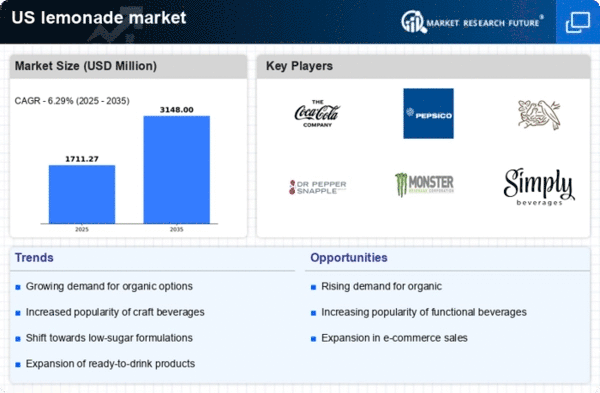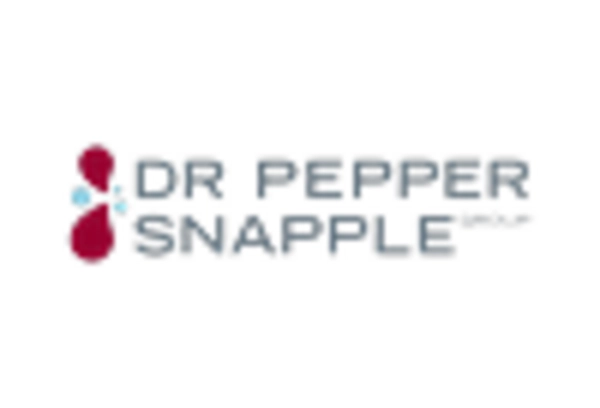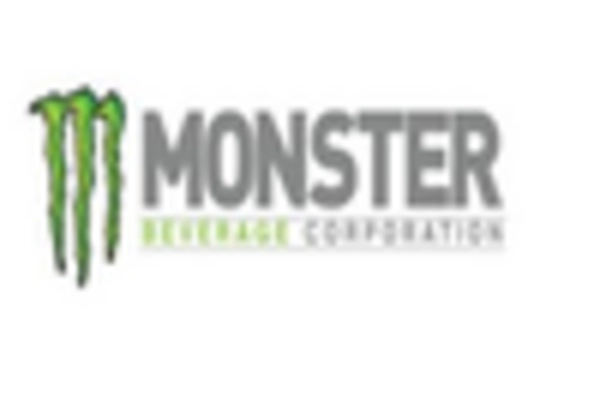Innovative Flavor Profiles
The lemonade market is witnessing a surge in innovative flavor profiles that cater to evolving consumer tastes. Manufacturers are experimenting with unique combinations, such as lavender-infused lemonade or spicy ginger lemonade, to attract adventurous consumers. This trend aligns with the broader movement towards artisanal and craft beverages, where consumers are willing to pay a premium for distinctive flavors. In 2025, it is estimated that flavored lemonade products could account for over 30% of total sales in the lemonade market. This diversification not only enhances consumer engagement but also encourages brand loyalty as customers seek out new and exciting options. As the market continues to evolve, companies that prioritize innovation in flavor offerings are likely to gain a competitive edge, thereby driving growth within the lemonade market.
Expansion of Distribution Channels
The lemonade market is experiencing an expansion of distribution channels, which is crucial for reaching a broader audience. Retailers are increasingly stocking lemonade products in various formats, including ready-to-drink bottles and concentrated mixes. This diversification in distribution allows consumers to access lemonade products in convenience stores, supermarkets, and online platforms. In 2025, it is projected that e-commerce sales of lemonade products will account for nearly 15% of total market sales, reflecting the growing trend of online shopping. This expansion not only increases visibility for brands but also enhances consumer convenience, thereby driving sales growth in the lemonade market. As companies adapt to changing consumer shopping habits, the ability to effectively distribute products across multiple channels will be a key driver of success.
Increased Focus on Natural Ingredients
The lemonade market is increasingly characterized by a focus on natural ingredients, reflecting a broader consumer trend towards clean label products. As consumers become more discerning about what they consume, there is a growing preference for lemonade made with organic lemons and natural sweeteners. This shift is evident in the rising sales of organic lemonade, which have seen a growth rate of approximately 12% in recent years. In 2025, the demand for natural and organic products is expected to continue to rise, with consumers willing to pay a premium for beverages that align with their health and wellness goals. This trend not only enhances the appeal of lemonade products but also positions the lemonade market favorably in a competitive landscape where transparency and quality are paramount.
Rising Demand for Refreshing Beverages
The lemonade market in the US experiences a notable increase in demand for refreshing beverages, particularly during warmer months. This trend is driven by consumers seeking alternatives to sugary sodas and energy drinks. In 2025, the market is projected to grow by approximately 8% as health-conscious individuals gravitate towards natural and refreshing options. The lemonade market benefits from this shift, as it offers a variety of flavors and formulations that appeal to diverse consumer preferences. Additionally, the rise of outdoor activities and social gatherings during the summer months further fuels the demand for lemonade products. As consumers prioritize hydration and flavor, the lemonade market is well-positioned to capitalize on this growing trend, potentially leading to increased sales and market share for established and emerging brands alike.
Sustainability Initiatives in Production
The lemonade market is increasingly influenced by sustainability initiatives in production processes. As consumers become more environmentally conscious, brands are adopting practices that minimize their ecological footprint. This includes sourcing ingredients from sustainable farms and utilizing eco-friendly packaging solutions. In 2025, it is anticipated that nearly 25% of lemonade products will feature sustainable packaging, reflecting a significant shift towards environmentally responsible practices. This trend not only appeals to eco-conscious consumers but also enhances brand reputation and loyalty. Companies that prioritize sustainability in their operations are likely to differentiate themselves in the competitive lemonade market, potentially leading to increased market share and consumer trust.
















